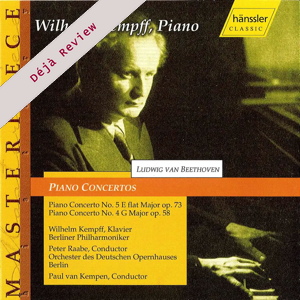
Déjà Review: this review was first published in November 2003 and the recording is still available.
Ludwig van Beethoven (1770-1827)
Piano Concerto No. 5 in E flat major, Op. 73 ‘Emperor’
Piano Concerto No. 4 in G major, Op. 58
Wilhelm Kempff (piano)
Berliner Philharmoniker/Peter Raabe (No.5)
Orchester des Deutschen Opernhauses, Berlin/Paul van Kempen (No.4)
rec. 1935 (No.5), 1941 (No.4), Berlin, Germany
Hänssler Classic CD94.045 [70]
This valuable release in Hänssler’s new series of budget historical issues brings two fairly early recordings by the celebrated German pianist, Wilhelm Kempff (1895-1991). He was in his fortieth year when the earlier of these two recordings was set down.
Kempff’s account of the ‘Emperor’ is a fine one. His pianism is elegant, poised and refined but in no way lacking in strength. In particular his playing in the massive first movement has an aristocratic feel to it. In his hands the slow movement is a highly sensitive nocturne, distinguished by some truly poetic playing. Kempff is well supported by the orchestra. The transition to the finale is magically done and the rondo itself is spirited and infectious.
In this performance Kempff is partnered by the Berlin Philharmonic under Peter Raabe (1872-1945). Raabe was a noted Liszt scholar as well as a conductor and administrator and was a prominent figure in German musical life in the 1930s and 1940s. He gives his soloist solid and reliable support. The recorded sound, from Deutsche Grammophon originals is pretty good for its age. As transferred by Hänssler there is some hiss but this is not such as to distract the listener. Unsurprisingly the piano reproduces well. However when Kempff is playing loudly the sound of his instrument dominates the sound picture.
The conductor in charge for the G major concerto is the Dutchman, Paul van Kempen (1893-1955). He gives Kempff a sensible, alert accompaniment. The very opening chords are beautifully weighted and placed by Kempff and preface a fine reading of the first movement from all concerned. There is a classic grace to the playing but his fingers have steel in them when required. In the slow movement he is just as poetic and refined as he was in the comparable movement of the ‘Emperor’ and the finale is charged with energy and joy. To my ears the piano sound is a bit brittle and “clangy” in this concerto but sonic limitations will not prevent enjoyment of what is a fine performance.
In the Fourth Concerto I wonder if Kempff plays his own cadenzas? They are certainly new to me and are not Beethoven’s. These are ingenious and well constructed. Actually, I thought they worked quite well. Sadly, Hänssler can’t help us with any information on this point. There are no notes whatsoever. Instead, listeners are invited to download the booklet from their website where English translations are available. However, when I wrote this review, I was unable to locate the booklet for this release. Otherwise, this is a distinguished and desirable issue.
Admirers of this great German pianist should certainly snap up this CD.
John Quinn
Buying this recording via a link below generates revenue for MWI, which helps the site remain free.



















